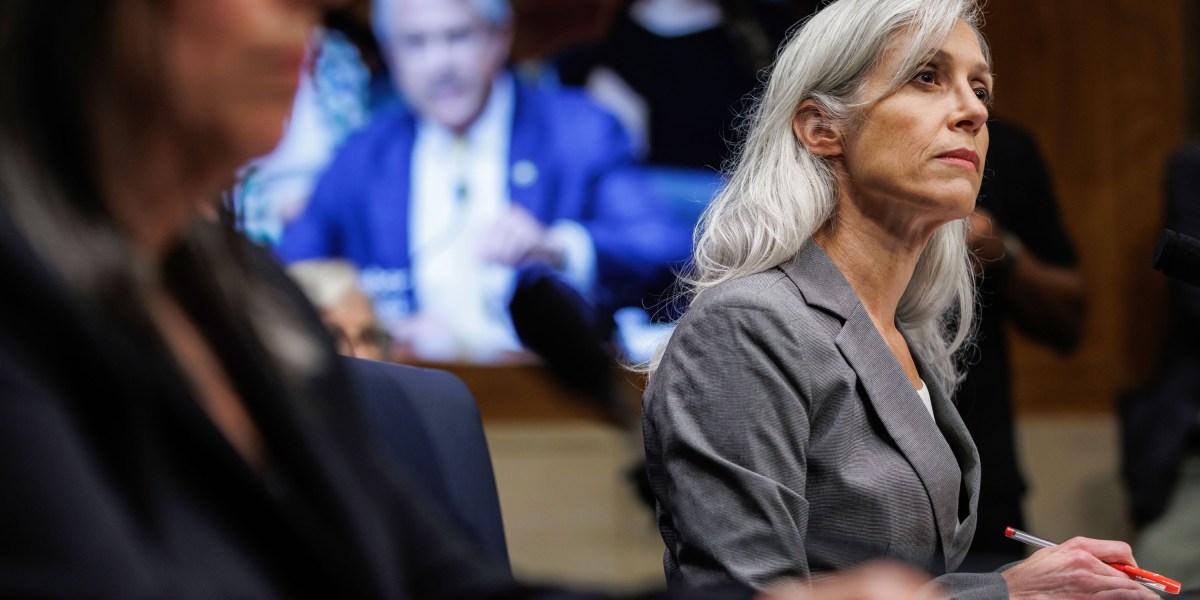
This week has been an eventful one for America’s public health agency. Two former leaders of the US Centers for Disease Control and Prevention explained the reasons for their sudden departures from the agency in a Senate hearing. And they described how CDC employees are being instructed to turn their backs on scientific evidence.
The CDC’s former director Susan Monarez and former chief medical officer Debra Houry took questions from a Senate committee on Wednesday. They painted a picture of a health agency in turmoil—and at risk of harming the people it is meant to serve.
On Thursday, an advisory CDC panel that develops vaccine guidance met for a two-day discussion on multiple childhood vaccines. During the meeting, which was underway as The Checkup went to press, members of the panel were set to discuss those vaccines and propose recommendations on their use.
Monarez worries that access to childhood vaccines is under threat—and that the public health consequences could be dire. “If vaccine protections are weakened, preventable diseases will return,” she said.
As the current secretary of health and human services, Robert F. Kennedy Jr. oversees federal health and science agencies that include the CDC, which monitors and responds to threats to public health. Part of that role involves developing vaccine recommendations.
As we’ve noted before, RFK Jr. has long been a prominent critic of vaccines. He has incorrectly linked commonly used ingredients to autism and made other incorrect statements about risks associated with various vaccines.
Still, he oversaw the recruitment of Monarez—who does not share those beliefs—to lead the agency. When she was sworn in on July 31, Monarez, who is a microbiologist and immunologist, had already been serving as acting director of the agency. She had held prominent positions at other federal agencies and departments too, including the Advanced Research Projects Agency for Health (ARPA-H) and the Biomedical Advanced Research and Development Authority (BARDA). Kennedy described her as “a public health expert with unimpeachable scientific credentials.”
His opinion seems to have changed somewhat since then. Just 29 days after Monarez took on her position, she was turfed out of the agency. And in yesterday’s hearing, she explained why.
On August 25, Kennedy asked Monarez to do two things, she said. First, he wanted her to commit to firing scientists at the agency. And second, he wanted her to “pre-commit” to approve vaccine recommendations made by the agency’s Advisory Committee on Immunization Practices (ACIP), regardless of whether there was any scientific evidence to support those recommendations, she said. “He just wanted blanket approval,” she said during her testimony.
She refused both requests.
Monarez testified that she didn’t want to get rid of hardworking scientists who played an important role in keeping Americans safe. And she said she could not commit to approving vaccine recommendations without reviewing the scientific evidence behind them and maintain her integrity. She was sacked.
Those vaccine recommendations are currently under discussion, and scientists like Monarez are worried about how they might change. Kennedy fired all 17 members of the previous committee in June. (Monarez said she was not consulted on the firings and found out about them through media reports.)
“A clean sweep is needed to reestablish public confidence in vaccine science,” Kennedy wrote in a piece for the Wall Street Journal at the time. He went on to replace those individuals with eight new members, some of whom have been prominent vaccine critics and have spread misinformation about vaccines. One later withdrew.
That new panel met two weeks later. The meeting included a presentation about thimerosal—a chemical that Kennedy has incorrectly linked to autism, and which is no longer included in vaccines in the US—and a proposal to recommend that the MMRV vaccine (for measles, mumps, rubella, and varicella) not be offered to children under the age of four.
Earlier this week, five new committee members were named. They include individuals who have advocated against vaccine mandates and who have argued that mRNA-based covid vaccines should be removed from the market.
All 12 members are convening for a meeting that runs today and tomorrow. At that meeting, members will propose recommendations for the MMRV vaccine and vaccines for covid-19 and hepatitis B, according to an agenda published on the CDC website.
Those are the recommendations for which Monarez says she was asked to provide “blanket approval.” “My worst fear is that I would then be in a position of approving something that reduces access [to] lifesaving vaccines to children and others who need them,” she said.
That job now goes to Jim O’Neill, the deputy health secretary and acting CDC director (also a longevity enthusiast), who now holds the authority to approve those recommendations.
We don’t yet know what those recommendations will be. But if they are approved, they could reshape access to vaccines for children and vulnerable people in the US. As six former chairs of the committee wrote for STAT: “ACIP is directly linked to the Vaccines for Children program, which provides vaccines without cost to approximately 50% of children in the US, and the Affordable Care Act that requires insurance coverage for ACIP-recommended vaccines to approximately 150 million people in the US.”
Drops in vaccine uptake have already contributed to this year’s measles outbreak in the US, which is the biggest in decades. Two children have died. We are already seeing the impact of undermined trust in childhood vaccines. As Monarez put it: “The stakes are not theoretical.”
This article first appeared in The Checkup, MIT Technology Review’s weekly biotech newsletter. To receive it in your inbox every Thursday, and read articles like this first, sign up here.





















